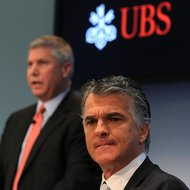 Arnd Wiegmann/ReutersSergio P. Ermotti, right, chief of UBS, and Thomas C. Naratil, the Swiss bank’s chief financial officer.
Arnd Wiegmann/ReutersSergio P. Ermotti, right, chief of UBS, and Thomas C. Naratil, the Swiss bank’s chief financial officer.
LONDON — UBS reported on Tuesday a 58 percent decline in its net profit in the second quarter as a fall in investment banking income weighed on the Swiss bank.
The drop in profit comes as the chief executive of UBS, Sergio P. Ermotti, is paring back the firm’s investment banking unit and expanding its wealth-management division.
Market volatility connected to the European debt crisis has hit trading activity across the financial services sector.
Like many of its rival, UBS’s investment banking unit continued to face difficult market conditions, and was also hit by a 349 million Swiss franc, or $356 million, loss connected to the botched Facebook initial public offering.
The bank said the lack of a solution to the European debt crisis and the Continent’s banking problems could harm the firm’s future profits.
“Failure to make progress on these key issues, accentuated by the reduction in market activity levels typically seen in the third quarter, would make further improvements in prevailing market conditions unlikely,” UBS said in a statement.
Net income at the Swiss bank, which was below analysts’ estimates, fell to 425 million Swiss francs during the three months through June 30, compared with 1.02 billion Swiss francs in the same period a year earlier. Operating income fell 10.6 percent, to 6.4 billion Swiss francs.
In early morning trading in Zurich, UBS shares fell 4.9 percent. Stock in the bank has dropped around 8 percent over the last 12 months.
Lower trading revenue and the loss incurred from the Facebook I.P.O. hurt UBS’s investment banking unit. In total, the division reported a pretax loss of 130 million Swiss francs in the second quarter. UBS does not provide net income figures for its separate business units.
Technical errors at Nasdaq exchange caused a delay in the start of trading of Facebook shares and later flooded the market with the social networking company’s stock. The problems caused UBS to receive more shares than its clients had ordered, according to a company statement.
“We will take appropriate legal action against Nasdaq to address its gross mishandling of the offering and its substantial failures to perform its duties,” the bank said.
Despite the declining activity in its investment banking unit, UBS said its wealth-management businesses had received 13.2 billion Swiss francs of new money during the second quarter of the year.
UBS continues to reduce its exposure to risky assets after a string of recent scandals, including a $2.3 billion trading loss prosecutors say was caused by Kweku M. Adoboli, a former trader at the bank.
The Swiss financial giant said it had cut its risk-weighted assets by 45 billion Swiss francs in the second quarter. The bank now plans to reduce the total figure to 270 billion Swiss francs by 2013, more than the previous target of 290 billion Swiss francs.
UBS said its core Tier 1 capital ratio, a measure of a firm’s ability to weather financial shocks, had risen to 8.8 percent, and would reach 9 percent by the end of the year.
The firm also cut more than 700 jobs during the three months through June 30, as part of the bank’s plan to achieve annual savings worth 2 billion Swiss francs by 2013. Last year, the Swiss firm said it would cut 3,500 jobs, with about half of the layoffs to come from its investment banking division.
UBS is also subject to several investigations into the manipulation of the London interbank offered rate, or Libor. Mr. Ermotti of UBS said the bank was in the process of conducting an internal review related to Libor and other benchmark rates. The British bank Barclays agreed a $450 million settlement last month with American and British authorities after some of its traders and senior executives were found to have altered the rate for financial gain.
In a conference call with reporters, Tom Naratil, the bank’s chief financial officer, declined to comment on whether UBS had made specific provisions to cover potential fines connected to the manipulation of the rate. The Swiss bank, however, set aside a further 130 million Swiss francs during the second quarter to cover litigation and regulatory issues, but did not say if the extra money was related to Libor.
“We have provisioned accordingly for all matters,” Mr. Naratil said.
Article source: http://dealbook.nytimes.com/2012/07/31/ubs-profit-hit-after-loss-on-facebook-ipo/?partner=rss&emc=rss

